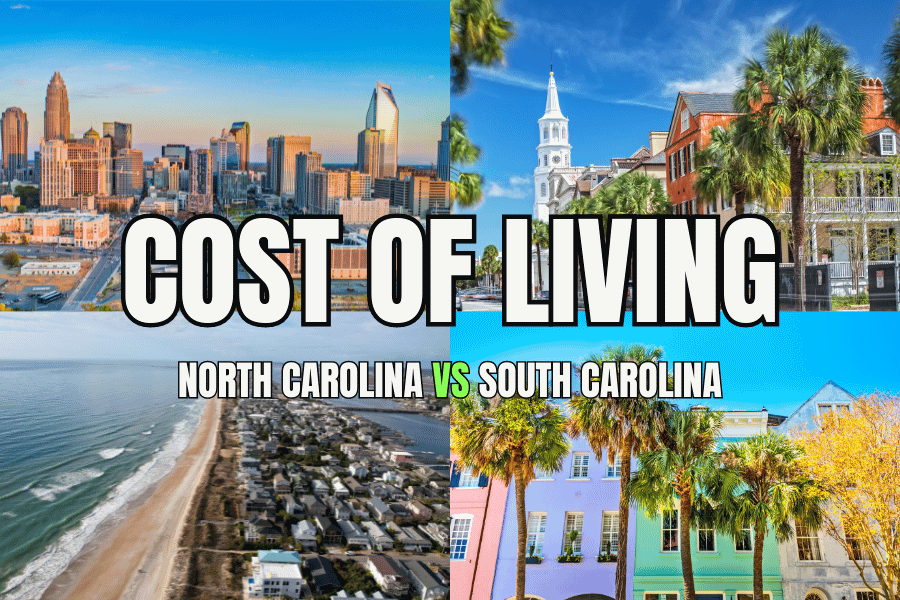Cost of Living in NC vs. SC
Is it cheaper to live in North Carolina or South Carolina? Here is what you need to know about the cost of living in each state before deciding to move!
North Carolina and South Carolina might be neighbors, but these two popular southeastern states have many things that set them apart, including the cost of living.
North Carolina is known for its beautiful scenic spots, larger cities, and a wide variety of industries, while South Carolina is known for its historical significance and southern hospitality.
If you are looking for a beautiful place to call home with fantastic weather, top amenities, and affordable living, both states have cities that fit the bill. However, when comparing the two, learning about the cost of living might be the deciding factor when choosing a place to live.
This comprehensive comparison will break down the key cost factors between these neighboring states to help you make an informed decision about where to call home.
Check out the cost of living in North Carolina and South Carolina
1. Cost of Living in North Carolina
North Carolina has the 27th lowest cost of living in the United States, making it an affordable option for families, young professionals, and retirees. With a cost of living comparable to the national average, North Carolina has become a popular place to call home in the Southeast.
The average personal total consumption cost in North Carolina is $43,959 per year, meaning a North Carolina resident must make about $3,663 monthly to live comfortably.
While the cost of living may be considered affordable, overpriced metropolitan areas, including Raleigh, Durham, Charlotte, Asheville, Winston-Salem, and Greensboro, make the state slightly more expensive than South Carolina and other states of similar size.
The Research Triangle region, with its concentration of technology companies, universities, and healthcare systems, tends to drive up costs but also provides higher-paying job opportunities.
Known for its reasonable prices, North Carolina is worth moving to if you want lower costs, beautiful cities, and top-rated amenities. Here is a side-by-side comparison of typical cost of living expenses in some of the most popular North Carolina cities:
Raleigh, NC
| Cost of Living Expense | Average Cost |
| Median Rent | $1,425/month |
| Energy Bill | $186.25/month |
| Phone Bill | $175.55/month |
| Doctor's Visit | $164.92 |
| Dentist Visit | $134.62 |
| Veterinary Visit | $69.89 |
*Data Sourced from Payscale.
Durham, NC
| Cost of Living Expense | Average Cost |
| Median Rent | $1,589/month |
| Energy Bill | $194.33/month |
| Phone Bill | $183.17/month |
| Doctor's Visit | $150.96 |
| Dentist Visit | $123.22 |
| Veterinary Visit | $66.90 |
*Data Sourced from Payscale.
Charlotte, NC
| Cost of Living Expense | Average Cost |
| Median Rent | $1,325/month |
| Energy Bill | $210.51/month |
| Phone Bill | $198.42/month |
| Doctor's Visit | $144.99 |
| Dentist Visit | $118.35 |
| Veterinary Visit | $76.50 |
*Data Sourced from Payscale.
.png)
2. Housing Costs in North Carolina
North Carolina has beautiful and affordable housing all over the state. Whether you want to live in the Research Triangle, to the west near the Blue Ridge Mountains, or to the east near the beaches, housing availability is one of the many reasons why so many people want to move here.
While popular urban areas have higher housing prices than lesser-known cities, North Carolina has many affordable neighborhoods and growing suburban areas that offer sought-after home types with varying home styles.
The Research Triangle area (Raleigh-Durham-Chapel Hill) commands premium prices due to high demand from tech workers, university employees, and healthcare professionals. Charlotte, as a major banking center, also sees elevated housing costs. However, smaller cities and rural areas offer much more affordable options.
The state benefits from a diverse economy that supports steady housing demand, with new construction helping to meet growing population needs. Areas like Wake County have seen rapid development, offering everything from luxury subdivisions to affordable starter homes.
With one of the hottest real estate markets in the country, North Carolina has seen increasing housing prices as demand rises and inventory becomes limited. To meet the high demand for housing, the state is building new residential construction quickly.
3. Average Income in North Carolina
According to the United States Census Bureau, North Carolina's median household income is $70,804. This is lower than the national median, which is $80,610.
While average income certainly depends on the type of job and experience that an individual has, the average income in North Carolina reflects the state's lower cost of living.
North Carolina boasts a diverse and robust economy anchored by several key industries. The Research Triangle is home to numerous technology companies, pharmaceutical giants, and world-renowned universities. Charlotte serves as a major financial center, housing the headquarters of Bank of America and major operations for Wells Fargo.
The state's economy also benefits from manufacturing, agriculture, and a growing film industry. A new report found what salary you need in order to live comfortably in all 50 states, and North Carolina's requirements reflect its balanced economy with good earning potential across various sectors.
Average salaries in North Carolina tend to be higher, particularly in technology, finance, and healthcare sectors. The concentration of Fortune 500 companies and research institutions creates competition for talent, driving up wages in many professional fields.

4. Taxes in North Carolina
The tax system in North Carolina ranks 12th on the 2025 State Income Tax Climate Index, making it one of the best states for taxes. North Carolina has a flat individual income tax rate of 4.25%, down from 4.5%, affecting all taxable income, including capital gains and most retirement income.
This reduction represents the state's commitment to maintaining competitive tax rates while funding essential services. The state eliminated its estate tax and has been gradually reducing income tax rates, making it increasingly attractive for both working professionals and retirees.
North Carolina's tax advantages include:
- Income Tax: The flat 4.25% rate applies to all income levels, making tax planning straightforward
- Sales Tax: State rate is 4.75%, though local taxes can bring the total to around 7.5% in many areas
- Property Taxes: Relatively moderate property tax rates, though they vary significantly by county
- Retirement-Friendly: Most retirement income is subject to the flat income tax rate

5. Cost of Living in South Carolina
According to Meric, South Carolina has the 20th lowest cost of living in the United States, making it slightly cheaper than North Carolina. With a cost of living 9% lower than the national average, South Carolina is an excellent choice for people looking for affordability, warm weather, and historic charm.
Even though living in South Carolina is generally more affordable than in other states, the cost varies depending on the city or region. Much like North Carolina, more prominent cities in South Carolina, including Charleston, Columbia, and Hilton Head Island, tend to have a higher cost of living.
Due to lower tax rates and affordable housing options, South Carolina residents tend to spend less than North Carolina residents. While the cost of living in South Carolina is typically inexpensive, the state is known for having one of the country's highest average monthly utility bills.
Electricity costs have risen by 12.9% across the county. Due to the state's hot climate, South Carolinians use a lot of air conditioning, leading to higher electricity bills. The average South Carolina resident spends $418.23 monthly on utilities and $138.16 on electricity alone.
Here is a side-by-side comparison of typical cost of living expenses in some of the most popular South Carolina cities:
Columbia, SC
| Cost of Living Expense | Average Cost |
| Median Rent | $1,088/month |
| Energy Bill | $234.78/month |
| Phone Bill | $221.29/month |
| Doctor's Visit | $119.40 |
| Dentist Visit | $97.46 |
| Veterinary Visit | $68.77 |
*Data Sourced from Payscale.
Charleston, SC
| Cost of Living Expense | Average Cost |
| Median Rent | $1,612/month |
| Energy Bill | $230.42/month |
| Phone Bill | $217.19/month |
| Doctor's Visit | $122.02 |
| Dentist Visit | $99.60 |
| Veterinary Visit | $69.82 |
*Data Sourced from Payscale.
Mount Pleasant, SC
| Cost of Living Expense | Average Cost |
| Median Rent | $2,266/month |
| Energy Bill | $230.42/month |
| Phone Bill | $217.19/month |
| Doctor's Visit | $122.02 |
| Dentist Visit | $99.60 |
| Veterinary Visit | $69.82 |
*Data Sourced from Payscale.

6. Housing Costs in South Carolina
Housing costs in South Carolina vary by region and city. Still, they are generally cheaper than the national average and can be more affordable than housing in North Carolina, depending on the area. Keep in mind that popular cities will have higher housing costs than surrounding areas.
The median home price in Columbia, South Carolina, is $265,000. On the other hand, Greenville, South Carolina, has a median home price of $415,000, and Charleston, South Carolina, has a median home price of $760,000. The higher the demand and the lower the inventory, the higher the housing prices will be.
The state offers particular value in suburban and rural areas, where you can find spacious homes with large lots at prices that might only buy a small condo in North Carolina's major metros. South Carolina's lower property values also mean lower down payment requirements for first-time buyers.
When considering housing options, consider location, the size of the home, the overall housing market in the area, and current mortgage rates. Offering single-family homes, new construction, and luxury properties, South Carolina has beautiful home types and styles all over the state and no shortage of friendly and welcoming communities.
7. Average Income in South Carolina
The median household income in South Carolina is $67,804, slightly lower than the median household income in North Carolina and lower than the median household income in the United States, which is $80,610.
South Carolina has worked hard to diversify its economy and attract new industries. The state has successfully lured manufacturing operations from companies like BMW, Boeing, and Volvo, creating well-paying jobs in advanced manufacturing. The Port of Charleston is one of the busiest on the East Coast, supporting logistics and trade-related employment.
Tourism and hospitality play significant roles in the state's economy, particularly in coastal areas. While these sectors provide numerous job opportunities, wages can be more variable and seasonal in nature.
Professional services, healthcare, and technology sectors are growing rapidly, especially around Greenville and Columbia. The state's business-friendly policies have attracted companies seeking lower operating costs while maintaining access to skilled workers.

8. Taxes in South Carolina
The tax system in South Carolina ranks 33rd on the 2025 State Business Tax Climate Index, below North Carolina. Known to have a progressive income tax, the graduated state individual income tax ranges from 0.00% to 7%. This means that the tax rate increases the more money that someone makes.
South Carolina is particularly attractive for retirees, offering substantial tax breaks on retirement income that can result in significant savings compared to other states.
South Carolina offers several tax advantages that can significantly impact your bottom line:
- Income Tax: Progressive rates ranging from 0% to 7%, but with numerous deductions and credits available
- Sales Tax: Base rate of 6% with local additions typically bringing it to 7-8%
- Property Taxes: Among the lowest effective property tax rates in the nation
- Retirement Haven: Generous exemptions for retirement income, including Social Security and significant portions of other retirement income

9. Which State Offers Better Value?
The choice between North Carolina and South Carolina ultimately depends on your priorities, career goals, and lifestyle preferences.
Choose North Carolina if you:
- Work in technology, finance, or research sectors where higher salaries offset higher costs
- Value access to major universities and cultural amenities
- Prefer more diverse climate and geography options
- Want proximity to major metropolitan areas
Choose South Carolina if you:
- Prioritize lower overall living costs and housing affordability
- Are approaching or in retirement and want tax-friendly policies
- Prefer coastal lifestyle and milder winters
- Value a more relaxed pace of life with growing economic opportunities
FAQs
Are state taxes higher in North Carolina or South Carolina?
On average, South Carolina pays fewer taxes than North Carolina, and state taxes are generally higher in North Carolina than in South Carolina.
Is NC or SC more tax-friendly towards retirees?
Although both North Carolina and South Carolina offer appealing tax benefits for retirement, South Carolina is typically more tax-friendly for retirees since it has one of the lowest property tax rates in the United States.
Are houses cheaper in North Carolina or South Carolina?
While the cost of housing varies on location, South Carolina generally has lower home prices and lower property taxes than North Carolina, making it an excellent option for affordable housing.
Methodology
Data was sourced from the U.S. Census Bureau, Sofi, Missouri Economic Research and Information Center, Tax Foundation, Payscale, and Rent Cafe to compare the cost of living in North Carolina and South Carolina.
Cost of Living in North Carolina Vs. South Carolina - Final Thoughts
Overall, South Carolina tends to have a lower cost of living than North Carolina, depending on the city and region. This is due to lower tax rates and more affordable housing options. On the other hand, utility costs in South Carolina are known to be more expensive, and North Carolina residents tend to have a higher average income.
Depending on where you decide to live in either state will determine whether or not you will have to pay more or less. If you want to live in a sought-after and exciting city, then prepare to pay more for the benefit of living in a popular area. While North Carolina generally has a higher cost of living, choosing to live in a lesser-known area could mean more affordable prices.
Are you ready to explore your options in North Carolina? Contact the experts at Raleigh Realty today to discuss your home buying or selling needs.

![What is the Cost of Living in North Carolina? [2025]](https://raleighrealty.com/rr-images/uploads/blogs/1748545345576-959574666-NC Cost of Living.png)


